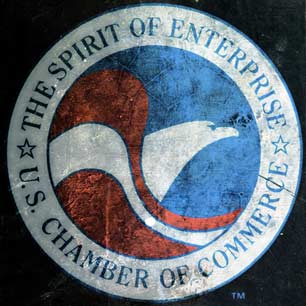Don’t be fooled by the U.S. Chamber of Commerce’s rhetoric that it represents the interests of small businesses in the U.S., because the interests of those really funding the Chamber are likely very different from the concerns of the nation’s mom-and-pop shops.
A new report by Public Citizen, called “The Gilded Chamber,” analyzes the U.S. Chamber of Commerce’s 2012 tax forms and found that more than half of all contributions to the Chamber came from just 64 donors in 2012.
The report looks at 1,619 contributions listed on Form 990 tax return documents, required for nonprofits to report contributions of more than $5000 to the IRS, by the Chamber and its partner, the U.S. Chamber Institute for Legal Reform. The Chamber Institute works in conjunction with the Chamber for legal reforms that largely favor business and against consumer access to the courts. Only a few of the organization’s overall donors make up the majority of their contributions, according to the report.
“It makes you wonder whether they have policy disputes, whether concerns from small businesses who donate to the Chamber and want certain things to come out of it; are they going to get their policies pushed by the Chamber if the companies giving the hundreds of thousands and millions are making up much more of the base of the Chamber’s fundraising?” Sam Jewler, the report’s author, told Truthout.
According to the report, the sum of all contributions of $5,000 or more amounted to more than 94 percent of the Chamber’s total donations in 2012, with an average donation at $111,254. Overall, the top 43 organizations contributed a combined $80.4 million to the Chamber. The Chamber’s revenue came largely from dozens of contributions of $500,000 or more and of $100,000 or more, according to the study.
“The U.S. Chamber is one of the largest conduits of ‘dark money’ in the country, but it refuses to disclose its donors,” said Lisa Gilbert, director of Public Citizen’s Congress Watch division, in a press release. “The American people deserve to know more about who’s influencing this powerful force in our politics. By looking at the size of the Chamber’s and [the Chamber Institute’s] donations, we can learn a little more about what kinds of businesses they represent — seemingly, very large ones.”
But the the Chamber Institute was even worse in terms of the disparity between large donations from a few entities and smaller ones. The report found that the Chamber Institute’s average donation was $454,110, with just 21 entities giving a combined $27.3 million. This accounted for more than two-thirds of the Chamber Institute’s total $43.6 million in donations. The Chamber Institute’s funding came almost exclusively from contributions ranging in the hundreds of thousands or millions. The report found that a huge majority, 71 percent, of the Chamber Institute’s 96 donations were for $100,000 or more, and more than half were for $250,000 or more.
“Generally, [the Chamber Institute] works to characterize consumer lawsuits as frivolous and a waste of time and money, and that may be the perspective of entities that were able to donate an average of $450,000 dollars — which what the [Chamber Institute] got in its average donation — but for the average consumer, a lot of people want to hold on to the right to sue in a class-action lawsuit if there’s a large number of people damaged by a company’s practices,” Jewler said.
The Chamber characterizes itself as representing “the interests of more than 3 million businesses of all sizes, sectors, and regions. Our members range from mom-and-pop shops and local chambers to leading industry associations and large corporations.” But this appears to be in stark contrast to what the organization’s funding actually says about the interests that hold sway over the Chamber.
But it’s still hard to say exactly what the interests of these large corporations and organizations are beyond generalizations because the donor’s identities remain largely unknown. According to the report, of the top 35 donations given to the Chamber, only Dow Chemical Co., publicly disclosed giving $2.9 million (its sixth biggest donation in 2012).
Our most important fundraising appeal of the year
December is the most critical time of year for Truthout, because our nonprofit news is funded almost entirely by individual donations from readers like you. So before you navigate away, we ask that you take just a second to support Truthout with a tax-deductible donation.
This year is a little different. We are up against a far-reaching, wide-scale attack on press freedom coming from the Trump administration. 2025 was a year of frightening censorship, news industry corporate consolidation, and worsening financial conditions for progressive nonprofits across the board.
We can only resist Trump’s agenda by cultivating a strong base of support. The right-wing mediasphere is funded comfortably by billionaire owners and venture capitalist philanthropists. At Truthout, we have you.
We’ve set an ambitious target for our year-end campaign — a goal of $250,000 to keep up our fight against authoritarianism in 2026. Please take a meaningful action in this fight: make a one-time or monthly donation to Truthout before December 31. If you have the means, please dig deep.
